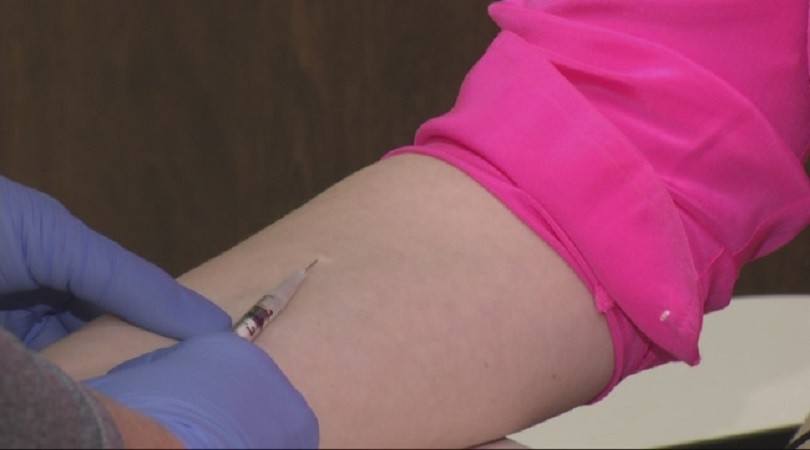Last Updated on January 6, 2025
Yes, tb test can be done safely during pregnancy. Pregnant women are considered at higher risk for developing active tb, so detecting it early is important for both the mother and the baby’s health.
Tuberculosis (tb) is a serious bacterial infection that can damage organs and can even be fatal if not treated promptly. Statistically, tb is one of the leading causes of death in women worldwide. As a pregnant woman, you may be required to undergo a tb test as part of your healthcare plan. Tb testing is important because pregnant women are more susceptible to active tb due to the weakened immune system that supports the developing fetus. Also, if testing positive for tb, a pregnant woman is at higher risk for complications and would need prompt medical intervention. This article explains how tb tests can be done safely during pregnancy, and why early testing is critical for better health conditions of both the mother and unborn child.

Credit: www.cdc.gov
Related: Can You Get Pregnant After A Tummy Tuck?
Understanding Tuberculosis And Pregnancy
Tuberculosis, commonly known as tb, is a contagious disease that usually affects the lungs. The infection spreads through the air when an infected person coughs or sneezes. While tb can occur in anyone, it becomes a significant concern when it affects pregnant women.
Here, we discuss the definition and causes of tb, its impact on pregnant women, and the importance of early screening and detection.
Definition And Causes Of Tb
- Tb is an infectious disease caused by a bacterium known as mycobacterium tuberculosis.
- It primarily affects the lungs, but it can also target other parts of the body like bones, joints, and glands.
- Tb spreads from person to person through the air when the infected person talks, coughs, or sneezes.
- A person can also develop tb if they come in contact with contaminated objects, like bedding or clothing.
Tb During Pregnancy: Symptoms And Risks
- Tb during pregnancy can cause weakness, fever, and persistent coughing.
- Pregnant women with tb may experience coughing up blood and have difficulty breathing, experiencing chest pain, and a loss of weight or appetite.
- Tb during pregnancy can also raise the risk of the following:
- Preterm labor
- Low birth weight
- Maternal death
How Tb Can Affect The Mother And The Baby
- Tb can cause complications for both the mother and the infant.
- Maternal tb can spread to the baby during childbirth or through breastfeeding.
- Infants whose mothers have tb may experience the following:
- Low birth weight
- Prematurity
- Development of tb
- Death, in rare cases
Importance Of Early Screening And Detection
- Early screening and detection of tb are essential in preventing the spread of the infection and protecting both the mother and the baby’s health.
- It is crucial to undergo screening if a pregnant woman has been exposed to someone with tb or in known areas where tb infections can occur.
- Tb screening during pregnancy is safe and involves a simple skin or blood test.
- Pregnant women who test positive for tb are prescribed anti-tubercular drugs as part of their treatment.
Understanding tuberculosis and its relation to pregnancy is crucial for mothers-to-be. Early screening and detection can help prevent the spread of tb infection and minimize the risk of complications for both the mother and the infant. Therefore, it is essential to maintain regular prenatal care and undergo screening and treatment when necessary.
Tb Testing Procedures For Pregnant Women
Possible exposure to tuberculosis (tb) can cause concern for anyone, especially for pregnant women. Tb is not only potentially dangerous for an expectant mother but also for an unborn child. This article will discuss the various types of tb tests available for pregnant women, addressing safety and pregnancy considerations during tb testing, and the advantages and disadvantages of each tb test.
Finally, it will provide guidelines and recommendations for tb testing while pregnant.
Types Of Tb Tests Available For Pregnant Women
There are two primary types of tb tests available for pregnant women. These tests aim to identify latent tuberculosis infection (ltbi) or active tuberculosis.
- Tst (tuberculin skin test): a healthcare professional injects a small amount of ppd (purified protein derivative) solution using a needle between the layers of the skin on the forearm. After two to three days, the healthcare professional will measure the size of redness or swelling on the injection site. If the skin shows a reaction to tb protein, it indicates a prior exposure to tb.
- Igra (interferon gamma release assay): a laboratory test that detects cellular immune response to tb infection. After collecting blood through a simple finger stick, the laboratory tests it for antibodies reacting to latent tb. It measures the interferon-gamma (ifnγ) release, which is caused by exposure to tb antigens.
Safety And Pregnancy Considerations During Tb Testing
Tb tests are safe for pregnant women if tests undergo according to the established recommended protocol. There is a small chance of experiencing a severe reaction, but it is rare.
It’s crucial to note that the tst test and igra tests are considered “safe” for pregnant women. However, the safety of the drugs used to treat tb in pregnant women is still the subject of research.
Related: Can You Get Fillers While Pregnant?
Advantages And Disadvantages Of Each Tb Test
- Tst: the tst test is less expensive than the igra test, and it’s widely accessible. Additionally, the tst may be beneficial in detecting previous exposure to tuberculosis.
However, tst also features some disadvantages. The tst test is sensitive but not specific. False-negative results can occur in cases where the person has received the bcg vaccine or certain other live vaccines. Also, false-positive results can occur in people who have had an infection caused by other organisms that are similar to tb.
- Igra: the igra test is more expensive than the tst, but it has a higher level of specificity and sensitivity. Additionally, if a patient tests negative for ltbi using igra, there’s no need for further tests.
Although, igra testing also has some disadvantages. It is more expensive than tst and increased technical demands for its use and interpretation.
Guidelines And Recommendations For Tb Testing While Pregnant
It is recommended for pregnant women to undergo tb testing. The timing and frequency depend on the woman’s risk of exposure.
- Women who are at higher risk of tb exposure should undergo tst or igra followed by chest radiograph if necessary
- Women at low risk should have a screening test first, followed by tst or igra only if the screening test is positive
- For women at medium risk, the decision of whether to use a screening test before the tst or igra must be made on an individual basis
Overall, tb testing is safe and essential to ensure the protection of pregnant women and the fetus. It is imperative to consult with health care providers before any screening or diagnostic procedures are performed.
Treatment Options For Pregnant Women With Tb
Can You Get A Tb Test While Pregnant?
Pregnant women, just like any other person, are susceptible to tuberculosis (tb) infection. Tb has not been known to directly harm the unborn child; however, it can pose a fatal risk to both the mother and the child if left untreated.
As such, it’s essential to determine whether a pregnant woman has tb since early detection and consistent treatment are crucial in managing the disease. The question is, can you get a tb test while pregnant? The answer is yes. Tb tests are safe for pregnant women, and the most common types of tb tests are the tuberculin skin test (tst) and the interferon-gamma release assays (igra).
Therefore, pregnant women with tb symptoms like persistent coughing, chest pains, and fever should take the test to ensure that they receive the proper treatment.
Importance Of Early And Consistent Treatment
Early treatment is critical in preventing the spread of tb and ensuring the safety of the mother and the baby. Identifying the disease early will prevent complications, making the treatment manageable. Poor treatment, however, can lead to severe health implications.
It’s essential to have a consistent and regular medication plan to prevent complications during pregnancy. More so, the inconsistency in the medication plan can lead to the acquisition of drug-resistant strains of tb, making the treatment even more complicated.
Tb Medication And Their Effects On Pregnancy And Breastfeeding
Various tb medications are effective in treating both pregnant and non-pregnant women. However, like any other medication, tb drugs have side effects that can affect pregnancy and breastfeeding. Pregnant women should consult their health care providers to determine the best course of action when experiencing tb symptoms.
The health care provider will consider factors like the trimester of pregnancy, potential drug interactions, and risks and benefits of medication against the risk of tb. It’s essential to note that not all tb medications are appropriate for pregnant or breastfeeding women.
Risk And Precautions During Tb Treatment While Pregnant.
Tb treatments have some risks and precautions that should be taken when administrating the medication. The challenges may include medical complications, potential drug reactions, or administering medication to the unborn child. Health care providers can guide the pregnant mother on the recommended medication and its administration to avoid any potential problems.
The medication plan should be composed of a suitable medication regimen and monitoring schedules. Pregnant women should avoid alcohol and other drug interactions that can lead to severe health consequences. If required, additional vitamins and nutrition supplements can improve medication’s efficacy.
Proper tb treatment during pregnancy provides the best chance of a positive outcome for both the mother and the child.
Related: Can You Get Lasik While Pregnant?
Alternative Options For Pregnant Women With Tb
If a pregnant woman is at high risk of tb or has active tb, alternative methods should be considered, such as:
- Treatment of latent tb infection
- Intensified testing for other infections like hiv
- Improved infection control planning in areas with high tb prevalence
- Active screening of individuals both symptomatic and asymptomatic to reduce the spread of tb.
These alternative methods aim to provide the best care for pregnant women, ensuring that they receive the tailored treatment they need. It’s advisable to maintain an appropriate level of monitoring to assess how the treatment is working, and the expectations as the treatment progresses.
Ultimately, identifying tb early will provide the best chance for the mother and the baby to experience a safer and healthier pregnancy.
Frequently Asked Questions For Can You Get A Tb Test While Pregnant?
So, let’s cut to the chase, can pregnant gals get a TB test?
Absolutely! Pregnant women can indeed get a TB test. Just like putting on a seatbelt before a drive, it’s all about ensuring safety for both mommy and baby.
Hang on a sec, is the TB test a bit like rolling the dice? Any risks involved?
Well, imagine wearing a raincoat during a drizzle instead of a thunderstorm. The risks are minimal. There might be slight discomfort or swelling at the test site, but serious side effects? They’re rarer than a blue moon!
Alrighty then, why would an expecting mom need this test in the first place?
Great question! It’s not about climbing a mountain just because it’s there. If there’s a risk of exposure or if she’s shown symptoms, the TB test can be a lifesaver. It’s all about staying a step ahead, you know?
If it turns out positive, does that mean the baby’s caught the bug too?
Not necessarily. Think of it like having your cake and eating it too—just because you have the TB bacteria doesn’t mean the baby does. But it’s crucial to consult with a doc to ensure everything’s hunky-dory.
Got it. But, are there any other ways to check for TB while carrying a bun in the oven?
Certainly! It’s like having more than one way to skin a cat. Besides the skin test, there’s the blood test called IGRA. Though it sounds fancy, it’s just another way to ensure that everything’s peachy with mom and baby.
Conclusion
After examining the information presented in this article, we can now conclusively say that pregnant women can indeed receive tb tests. Tb is a dangerous disease and its impact on both the mother and unborn child can be severe if left untreated.
As a result, it is critical for pregnant women who may have been exposed to tb to undergo testing as soon as possible. Tb testing during pregnancy is both safe and necessary, and a positive result should be treated immediately to protect the health of both the mother and child.
While there are some potential risks associated with taking certain forms of tb testing, these are generally quite minimal, and the benefits of testing greatly outweigh any potential dangers. If you have concerns about tb during pregnancy, speak with your healthcare provider to learn more about the testing options available to you.











